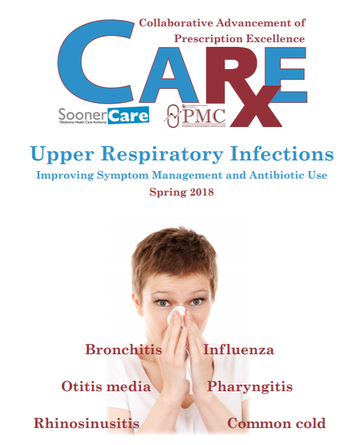A Healthy Dose of Flexibility: Identifying Unique Clinician Challenges to Improve Patient Outcomes5/3/2021
An interview with Jacki Travers, PharmD, Clinical Academic Detailing Pharmacist, Pharmacy Management Consultants (PMC). PMC operates out of the University of Oklahoma College of Pharmacy and has been providing educational and consultative services for the Oklahoma Medicaid Pharmacy Program for 25 years. PMC began its academic detailing program in 2014 and Jacki was onboarded in 2015 as the first detailer. The academic detailing work is funded primarily by the Health Services Initiative Grant received by Oklahoma Medicaid from the Children's Health Insurance Program. Jacki also serves as an expert training facilitator for the NaRCAD team. by Anna Morgan, MPH, RN, PMP, NaRCAD Program Manager Tags: Detailing Visits, Evaluation, Primary Care Anna: Hi Jacki! We can’t wait to hear about your academic detailing work in Oklahoma! Can you tell us a little bit about your program and the clinical topics you detail on? Jacki: Absolutely. Our program is smaller than other AD programs – we have one FTE dedicated to AD and that’s me! Most of our topics are pediatric-focused, based on our funding from the Children’s Health Insurance Program. I've detailed providers on topics including ADHD, appropriate use of atypical antipsychotic medications, treatment of upper respiratory infections, use of psychosocial interventions for mental health needs, implementation of shared decision-making tools, and immunizations. I've established a relationship with more than 800 providers and their staff across primary care and specialty care settings in the state of Oklahoma. Anna: That's impressive, Jacki. You detail on such unique clinical topics – can you share some challenges related to these topics and how you’ve overcome them? Jacki: We're primarily a rural state, so resources can be hard to access. There's no point in asking a provider to commit to a change and then have them hit this continued wall of unforeseen lack of resources. As a result, I spend a fair bit of my time collecting information that will help providers bridge the implementation gap. I try to connect providers with resources like care management teams, electronic referral platforms, or other providers in their area who are implementing particular services like parent-child interaction therapy, medication therapy management, and applied behavioral analysis. If I'm asking a provider to do something, I want to make sure that they have the tools and the bandwidth to carry it out! Anna: What a great point! You can’t expect a clinician to make changes if they don’t have the resources to do it. Are there additional challenges that have come up in your academic detailing work? Jacki: Most of the challenges I face are the same as those faced by all detailers - access to clinicians, scheduling visits, handling objections, overcoming barriers, gaining commitment to change, and getting access to resources. I overcome these barriers by getting warm handoffs from previously detailed providers, using champions whenever I can, and putting myself in the mind of providers to anticipate what specific resistance there might be so that I can come up with enablers. Sometimes I do a bit of out-of-the-box thinking for the specific challenges and always bring a healthy dose of flexibility. In one case, I dusted off my high school French and used Google translate to ask a French-speaking researcher for permission to modify one of her shared decision-making tools. I could have asked her in English, and it would have been just fine, but I felt like it was going to demonstrate my respect for her work if I did my best to communicate in her preferred language. Whenever possible, I want to try to connect with people in the way that is the most seamless for them. And that's absolutely true for detailing too! I've had providers who want to meet over coffee and muffins at 6:00 AM because it's the only time they have in their day, or providers who need to pump their breast milk during our visit. I roll with it all and make sure I’m meeting providers where they’re at.  Anna: Being flexible certainly makes for effective detailing visits. Can you tell us a little more about how you meet providers where they’re at and customize your detailing approach? Jacki: When I’m detailing on one topic, I’m always thinking about future topics by gathering data from providers so that I can better understand their challenges. I ask providers their biggest concerns and I’ve been really surprised at how ready they are to share gaps in resources and information. That’s how our antibiotic topic materials came about. Many providers shared that they often have patients who ask for antibiotic prescriptions and how they have to battle against patient satisfaction surveys that seem to penalize them for not prescribing antibiotics. The antibiotic detailing materials we created had some scripting to help reduce antibiotic prescribing while also increasing patient satisfaction. The materials included shared decision-making tools with a breakdown of non-antibiotic treatment evidence like humidifiers, honey, saline spray, etc. It's all about identifying why the providers might not be feeling empowered to follow the evidence and then helping them find that empowerment through knowledge, motivation, and resources. Anna: I love that you continually assess the needs of the providers in your state to inform future work and strengthen relationships. I’m sure with the 800 providers and staff you’ve detailed that you’ve had some success stories– can you share one with us? Jacki: Of course! I have a great story that shows how important it is to assess needs, really listen, and empathize with clinicians and what they’re going through. I was at a pediatric practice and it had taken me four solid months to get in the door. There had been some pretty strong reluctance even to schedule a visit. Once I did get on the calendar, they canceled and rescheduled multiple times. There was a sense of defensiveness, as though the staff may have been concerned that the visit would be punitive. As I started my needs assessment questions, one of them mentioned that they didn't understand how this topic related to the other meetings they’ve had. I explored that comment a bit more with them and it turned out they had just undergone an extensive audit by the state agency. The whole process left them feeling examined and analyzed. Once I learned about their negative experience, I put their fears to rest, let them know that our time together was completely unrelated to that audit, and that I was there to help them get the best evidence in a digestible format. You could almost see the pressure leaving the room at that point - their body language changed, they were engaged, and they were asking questions and strategizing. By the end of the meeting, the practice manager told me I wouldn’t have any more trouble getting on their calendar. She said, "this was not a waste of my time, and make no mistake, I would tell you if it was!” Anna: That's amazing – what a great story. Before we wrap up, let’s focus on evaluating success. I know you’ve had some remarkable results with your ADHD topic, including a cost savings of more than $226,000 - can you share some of your most recent evaluation data with us? Jacki: We’re most proud of outcomes from when we worked with providers to reduce the number of unnecessary antibiotic prescriptions, particularly for upper respiratory infections. The providers who were receiving detailing reduced their antibiotic prescribing by more than 17% and they also reduced their use of non-first line agents for upper respiratory infections by more than 16%. However, we wanted to make sure that there weren’t any unintended consequences and that patients weren't having longer or more serious infections when the antibiotics were scaled back. To accomplish this, first, we looked at the prescribing in the previous five years and then one year after the detailing campaign. We identified an oral antibiotic prescription and then looked at the following two weeks after that antibiotic was prescribed to see whether or not there was a hospitalization or an emergency department visit. We found 90% fewer emergency department visits and more than 50% fewer hospitalizations after our detailing campaign. Of the hospitalizations, patients had shortened stays by more than 50%. Even though the patient outcome is, of course, the goal, you can also demonstrate cost savings for your funders and stakeholders. We looked at the dollar amounts for the avoided hospital stays and ER visits and found a total annual cost savings of more than $834,000. Anna: Wow, that’s impressive! Thank you for taking the time to share your insights and your program’s challenges, successes, and data. You’re an asset to all the communities you detail in and bring so much value to clinicians throughout Oklahoma. We’re also extremely lucky to have you as part of our extended team and larger AD community. We’re looking forward to catching up again soon! Hear more about Jacki’s reflections on the impact of AD here. Have thoughts on our DETAILS Blog posts? You can head on over to our Discussion Forum to continue the conversation!  Biography. Jacki joined Pharmacy Management Consultants (PMC) in 2015 and serves as the chair of the academic detailing committee. She has been active in the development and implementation of PMC’s academic detailing program in service to Oklahoma Medicaid providers. Prior to joining PMC, she served in the practice settings of independent, hospital, and clinical pharmacy. She currently develops detailing materials, delivers detailing services, and analyzes program results for multiple topics as part of a statewide plan. Her program efforts focus on bridging the gap between information and application in order to provide quality health care in a fiscally responsible manner. Comments are closed.
|
Highlighting Best PracticesWe highlight what's working in clinical education through interviews, features, event recaps, and guest blogs, offering clinical educators the chance to share successes and lessons learned from around the country & beyond. Search Archives
|

